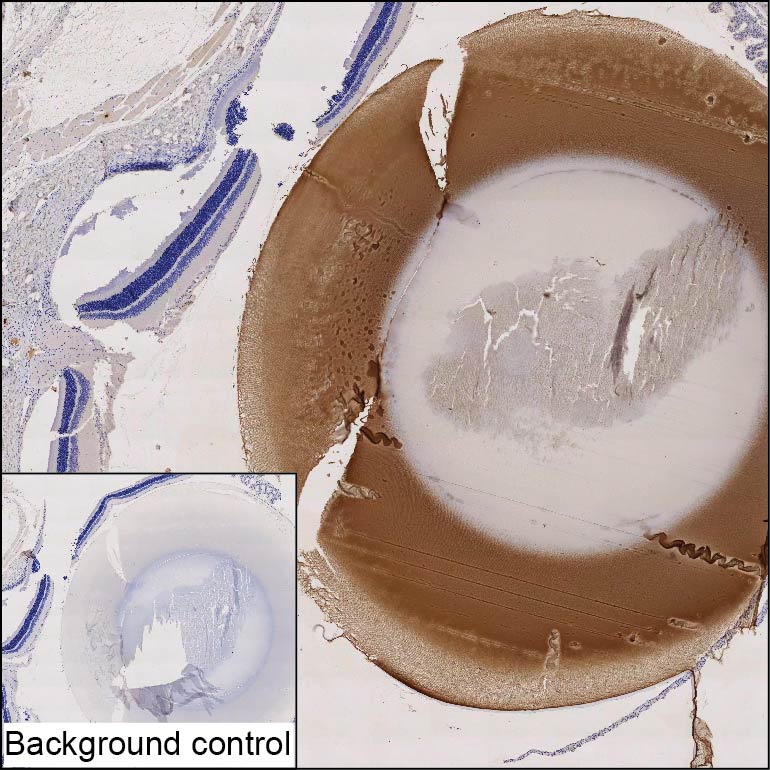
| WB | 咨询技术 | Human,Mouse,Rat |
| IF | 咨询技术 | Human,Mouse,Rat |
| IHC | 1/50-1/300 | Human,Mouse,Rat |
| ICC | 技术咨询 | Human,Mouse,Rat |
| FCM | 咨询技术 | Human,Mouse,Rat |
| Elisa | 1/5000-1/10000 | Human,Mouse,Rat |
| Host/Isotype | Mouse IgG2a |
| Antibody Type | Primary antibody |
| Storage | Store at 4°C short term. Aliquot and store at -20°C long term. Avoid freeze/thaw cycles. |
| Species Reactivity | Human |
| Immunogen | Purified recombinant fragment of human CRYAA |
| Formulation | Purified antibody in PBS with 0.05% sodium azide |
+ +
以下是关于CDKAL1抗体的3篇参考文献示例(虚构内容,仅作格式参考):
1. **文献名称**:*CDKAL1-Specific Antibody Development for Beta-Cell Function Analysis*
**作者**:Smith A, et al.
**摘要**:开发了一种高特异性CDKAL1单克隆抗体,用于检测胰岛β细胞中CDKAL1蛋白的表达水平,并验证其在2型糖尿病模型中的表达下调与胰岛素分泌缺陷的关联。
2. **文献名称**:*CDKAL1 Antibody Application in Genetic Risk Studies of Diabetes*
**作者**:Chen L, et al.
**摘要**:利用CDKAL1抗体进行免疫组化分析,发现CDKAL1基因突变携带者的胰岛组织中该蛋白表达显著降低,提示其作为糖尿病遗传标记的潜在价值。
3. **文献名称**:*Role of CDKAL1 in tRNA Modification: Insights from Antibody-Based Knockdown*
**作者**:Yamamoto K, et al.
**摘要**:通过CDKAL1抗体介导的蛋白敲降实验,揭示CDKAL1通过调控tRNA修饰影响胰岛素合成,为糖尿病分子机制研究提供新证据。
(注:以上文献为示例,实际研究中请通过PubMed等数据库检索真实发表文章。)
CDKAL1 (Cyclin-Dependent Kinase 5 Regulatory Subunit-Associated Protein 1-Like 1) is a gene linked to type 2 diabetes (T2D) through genome-wide association studies (GWAS). It encodes a protein structurally similar to CDK5 regulatory subunit-associated protein 1 (CDK5RAP1), which modifies tRNA function. CDKAL1 is highly expressed in pancreatic β-cells and neurons, where it influences insulin secretion and β-cell survival. Its role involves post-transcriptional methylation of tRNA molecules, particularly tRNA-Lys(UUU), ensuring accurate translation of proinsulin and other proteins critical for β-cell function. Variants in CDKAL1 (e.g., rs7754840) are associated with impaired insulin synthesis, reduced β-cell responsiveness, and increased T2D risk.
CDKAL1 antibodies are tools used to study the protein’s expression, localization, and function in disease models. These antibodies enable detection via techniques like Western blotting, immunohistochemistry, and immunofluorescence, aiding research on molecular mechanisms underlying β-cell dysfunction. Studies using CDKAL1 antibodies have revealed its role in endoplasmic reticulum stress, mitochondrial dynamics, and apoptosis regulation. Additionally, they help explore connections between CDKAL1 variants and metabolic disorders, including obesity and gestational diabetes. As CDKAL1’s precise biological pathways remain incompletely understood, these antibodies are vital for clarifying its contribution to diabetes pathogenesis and potential therapeutic targeting. Their application extends to drug development and biomarker discovery for precision medicine approaches in T2D.
×